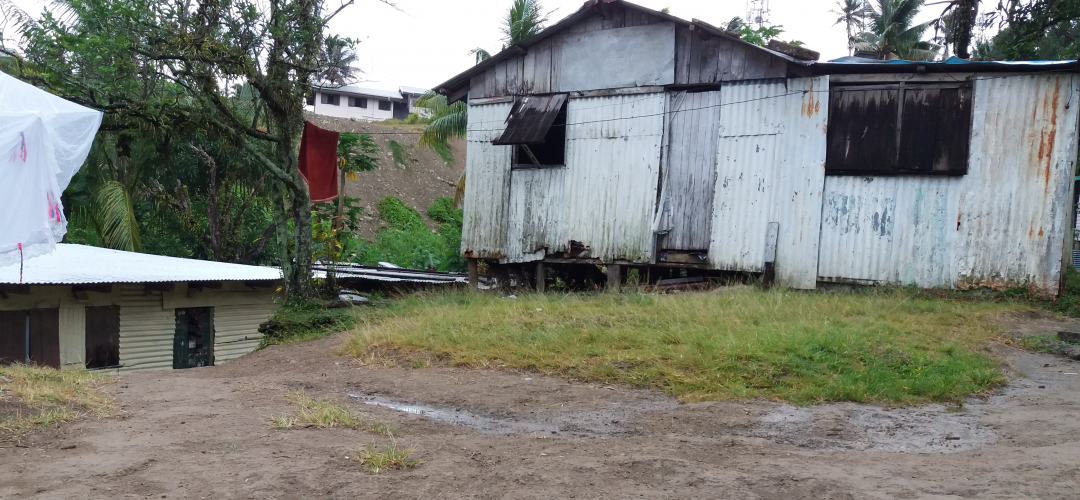The Struggle For Land Rights

By Linda Filiai
More than one hundred thousand Fijians live every day with the insecurity that comes with being an informal settler.
Many are trapped into unsatisfactory conditions by the high cost of living.
The Fiji government and civil society organisations have new programs to address informal settlements. Some are creating hope that a transition to legal tenancy may be possible.
The struggles for informal settlers are many.
The Director of Peoples Community Network (PCN) Semiti Qalowasa says most informal settlers are living in the settlements under the sympathy of the landowners.

Director of Peoples Community Network (PCN) Semiti Qalowasa
“If you’re living in informal settlements, you’re living at the mercy of the landowners so whatever they have decided, you don’t have a say in it. They’re solely insecure in all forms of security, insecurity of land tenure, insecurity of cyclones and insecurity of education,” Qalowasa says.
PCN is a community based organisation for people living in informal settlements. Its mission is to help empower people in poorer communities to “stand up and walk, stand up and talk” and so take responsibility for their own development and participate in building a better Fiji.
Qalowasa says the main reason why people are living at informal settlements is not because they chose to live there but because the cost of living is very high compared to the wages that they are getting.
“About 80 percent of them earning wages below 10, 000 dollars, some of them are earning 6000 dollars a year, while some are earning 5000 dollars,” Qalowasa says.
He added that the cost of land is really high and people at the informal settlements cannot afford it.
Qalowasa says people in the informal settlements are vulnerable to any disease because of overcrowding. In some cases five families are staying in one building.
He says about 25 per cent of Fiji’s total population is living in informal settlements
PCN is trying its best to cooperate with government and landowners to help these people.
“That is why we have the Lagilagi Housing. Lagilagi is no longer a squatter (settlement) and people are leasing it (land),” Qalowasa said.
In “The Lami area, we have negotiated with the government and landowners for them to regularize the piece of land, now it becomes a village,” he says.
Qalowasa says people are moving into urban areas for different reasons including looking for a better jobs and education.
“What we are trying to do is to minimize the number of squatters by negotiating with land owners to give people more security,” he says.
Meanwhile the Minister for Local Government, Housing and Environment Parveen Kumar says the government has started subdividing some of the informal settlements around Suva and Nausori corridor to ensure a proper access to roads, water and electricity.
He says the problem with the informal settlements has been there for years and not all the people in the informal settlement are poor.
“We have carried out the social economic survey in this area and we have got all the data of who they are. It is alarming to see that the people have houses somewhere else but they built it there and rent it out,” Kumar said
The Minister also call upon those who had done this to stop because it could be a way of encouraging people to live in informal settlements.
According to the Department of Town and Country Planning, the land in Fiji is managed through three complementary systems- native land, freehold land and crown land.
The Department stated that close to 83 per cent on the land is native Land, about 10 per cent is freehold land and seven per cent is crown land administered which is under the Departments of Lands.

Tevita Tabaiwalu Turaganikoro of Naicovu settlement
Meanwhile, the Turaganikoro of Naicovu settlement in Suva Tevita Tabaiwalu confirms that none of the residents have any written agreement with the landowner but it is just a mutual understanding to look the place.
“When the landowner gave us the permission to live here, he told us not to break any law and to devote more to our spiritual growth,” Tabaiwalu says.
He says that there are about 25 houses in the settlement and people from different areas including Tailevu, Lau, and Naitasiri are occupying it.
Tabaiwalu says they will be relocating if the landowner wanted them to move but at least give them enough time to relocate.
Some informal settlements in Fiji have been informed to relocate including Nanuku settlement in Vatuwaqa.
According to Habitat for Humanity Fiji, the 2016 Country’s Profile, an estimated 140,000 people currently live in substandard housing conditions in informal settlements, and the number has increased by 5 percent from 2007 to 2012











No Comments
No comments yet. You should be kind and add one!